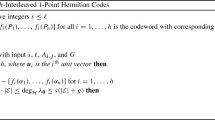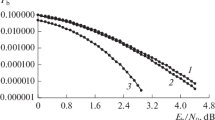Abstract
The performance of either structured or random turbo-block codes and binary, systematic block codes operating over the additive white Gaussian noise (Awgn) channel, is assessed by upper bounds on the error probalities of maximum likelihood (Ml) decoding. These bounds on the block and bit error probability which depend respectively on the distance spectrum and the input-output weight enumeration function (Iowef) of these codes, are compared, for a variety of cases, to simulated performance of iterative decoding and also to some reported simulated lower bounds on the performance ofMl decoders. The comparisons facilitate to assess the efficiency of iterative decoding (as compared to the optimalMl decoding rule) on one hand and the tightness of the examined upper bounds on the other. We focus here on uniformly interleaved and parallel concatenated turbo-Hamming codes, and to that end theIowefs of Hamming and turbo-Hamming codes are calculated by an efficient algorithm. The usefulness of the bounds is demonstrated for uniformly interleaved turbo-Hamming codes at rates exceeding the cut-off rate, where the results are compared to the simulated performance of iteratively decoded turbo-Hamming codes with structured and statistical interleavers. We consider also the ensemble performance of ‘repeat and accumulate’ (Ka) codes, a family of serially concatenated turbo-block codes, introduced by Divsalar, Jin and McEliece. Although, the outer and inner codes possess a very simple structure: a repetitive and a differential encoder respectively, our upper bounds indicate impressive performance at rates considerably beyond the cut-off rate. This is also evidenced in literature by computer simulations of the performance of iteratively decodedRa codes with a particular structured interleaver.
Résumé
Les performances sur canal gaussien de turbo codes en bloc binaires systématiques, avec entrelacement structuré ou aléatoire sont estimées, à l’aide de bornes supérieures sur les probabilités d’erreurs, pour un décodage à maximum de vraisemblance. Ces bornes relatives à des blocs ou à des bits dépendent respectivemet du spectre des distances et de la fonction d’énumération des poids d’entrée et de sortie des codes. Ces bornes sont comparées, pour différents cas de figure, aux performances du décodage itératif obtenues par simulation et à certaines bornes inférieures présentées dans la lit-térature. Ces comparaisons permettent de juger de l’efficacité du décodage itératif vis-à-vis du décodage à maximum de vraisemblance, et d’évaluer la pertinence des bornes supérieures d’erreurs proposées dans cet article. Une attention particulière est portée aux codes turbo-Hamming avec concaténation parallèle et entrelacement uniforme (ou statistique). Les fonctions d’énumeration de poids pour les codes de Hamming et les codes turbo-Hamming sont calculées à l’aide d’algorithmes originaux. L’utilité des bornes d’erreurs proposées pour les codes turbo-Hamming est démontrée, pour des débits qui vont bien au delà de la coupure, par une bonne concordance avec les résultats de simulation relatifs au décodage itératif, et cela pour différents types d’entrelacement. Nous considérons également le cas particulier des codesRa (répétition et accumulation) et d’une famille de codes en bloc à concaténation série et entrelacement uniforme introduite par Divsalar, Jin et McEliece. Les codes extérieur et intérieur y ont une structure très simple: un codeur à répétition et un codeur différentiel respectivement. Malgré cela les performances que l’on peut observer à partir des bornes supérieures de probabilités d’erreurs ou des simulations relatives au décodage itératif sont impressionnantes, y compris au delà du débit de coupure.
Similar content being viewed by others
References
Adde (P.), Pyndiah (R.), Raoul (O.). Performance and complexity of block turbo decoder circuits,Proceedings of the Third IEEE International Conference on Electronics, Circuits and Systems (ICECS ’96), pp. 172–175, New-York, USA, (1996).
Adde (P.), Pyndiah (R.), Raoul (O.), Inlsan (J. R.). Turbo block decoder design,Proceedings of the International Symposium on Turb Codes and Related Topics, pp. 166–169, Brest, France, (3–5 September 1997).
Aitsab (O.), Pyndiah (R.). Performance of Reed-Solomon block turbo code,Proceedings of the IEEE GLOBECOM 1996, pp. 121–125, London, England, (18–21 November 1996).
Bahl (L. R.), Cocke (J.), Jelinek (J.), Raviv (J.). Optimal decoding of linear codes for minimizing symbol error rate.IEEE Trans, on Information Theory,25, pp. 342–345, (1979).
Barbulescu (S. A.). Iterative decoding of turbo codes and other concatenated codes,Ph.D. dissertation, Faculty of Engineering, University of South Australia, (February 1996).
Benedetto (S.) Montorsi (G.). Unveiling turbo codes: some results on parallel concatenated coding schemes,IEEE Trans, on Information Theory,42, no 2, pp. 409–428, (March 1996).
Benedetto (S.), Divsalar (D.), Montorsi (G.), Pollara (F.). Serial concatenation of interleaved codes: performance, analysis, design and iterative decoding,IEEE Trans, on Information Theory,44, no 3, pp. 909–926, (May 1998).
Berrou (C.), Evano (S.) Battail (G.). Turbo-block-codes,Seminar on Turbo Coding, Lund University, Sweden, (28–29 August 1996).
Buch (G.), Burkert (F.). Unequal error protection with productlike turbo codes,Proceedings 1998 IEEE International Symposium on Information Theory (ISIT ’98), p. 60, MIT Cambridge, MA, USA, (16–21 August 1998).
Cheng (J. F.), McEliece (R. J.). Unit-memory Hamming turbo codes,Proceedings 1995 IEEE International Symposium on Information Theory, Whistler, British Columbia, Canada, (17–22 September, 1995).
Divsalar (D.), Jin (H.), McEliece (R. J.). Coding theorems for turbo-like codes,1998 Allerton Conference, (23–25 September. 1998).
Gallager (R.G.). Low density parity check codes,MIT Press, Cambridge, Mass., (1963).
Goalic (A.), Pyndiah (R.). Real-time turbo-decoding of product codes on a digital signal processor,Proceedings of IEEE Globecorn 1997, pp. 624–628, Phoenix. Arizona USA, (3–8 November 1997).
Guinand (P.), Lodge (J.), Papke (L.). An alternative approach to the design of interleavers for block-turbo codes,Information Theory and Applications II, 4th Canadian Workshop, Canada, May 1995. Selected Papers:Springer-Verlag, pp. 95–103, Berlin, Germany, (1996).
Hacenauer (J.).Offer (E.), Papke (L.). Iterative decoding of binary block and convolutional codes,IEEE Trans, on Information Theory,42, no 2, pp. 429–445, (March 1996).
Huber (J.), Schetelig (M.), Wachsmann (U.). Turbo codes over simple block codes and turboproduct codes,Mediterranean Workshop on Coding and Information Integrity, Palma De Mal- lorca, Spain, (28 February, 1996).
Katsman (G. L.), Tsafsman (M. A.). Spectra of algebraic geometric codes.Problems of Information Transmission,23, no 1–4, pp. 262–275, (1987).
Lentmaier (M.), Ziganoirov (K. Sh.). Iterative decoding of generalized low-density parity-check codes,Proceedings 1998 IEEE International Symposium on Information Theory (ISIT ’98), MIT Cambridge, MA, USA, p. 149, (16–21 August 1998).
Lodge (J.), Young (R.), Hoeher (P.), Hagenaubr (J.). Separable MAP ‘filters’ for the decoding of product and concatenated codes,Proceedings of the IEEE International Conference on Communications ICC’93, pp. 1740–1745, Geneva, Switzerland, (23–26 May. 1993).
Lucas (R.). On iterative soft-decision decoding of linear binary block codes,Ph.D. dissertation, Univ. Ulm, Germany, (1997).
Lucas (R.).Bossert (M.), Breitbach (M.). On iterative soft- decision decoding of linear binary block codes and product codes,IEEE Journal on Selected Areas in Communications,16, no 2, pp. 276–296, (February 1998).
Moher (M.), Gulliver (T. A.). Cross-entropy and iterative decoding.IEEE Irans. on Information Theory,44, no 7, pp. 3014- 3097, (November 1998).
Moorthy (H. T.), Lin (S.), Kassami (T.). Soft decision decoding of binary linear block codes based on iterative search algorithm,IEEE Trans. On Information Theory,43, no 3, pp. 1030–1039, (May 1997).
Nickl (H.), Hacenauer (J.), Burkert (F.). Approaching Shannon’s capacity limit by 0.27 dB using simple Hamming codes,IEEE Communications Letters,1, no 5, pp. 130–132, (September 1997). See also:Nickl (H.),Hacenauer (J.),Burkert (F.), The race to Shannon’s limit: Discipline high-rate codes,Proceedings of the International Symposium on Turbo Codes and Related Topics, pp. 239-242, Brest, France, (3–5 September 1997).
Ping (L.). Chan (S.), Yeung (K. L.). Iterative decoding of multidimensional concatenated single parity check codes.Proceedings 1998 IEEE International Conference on Communications, Atlanta, USA, (June 1998).
Poltyrev (G.). Bounds on the decoding error probability of binary linear codes via their spectra,IEEE Trans, on Information Theory,40, no 4, (July 1994). See also:Herzberg (H.),Poltyrev (G.). The error probability of M-aryPsk block coded modulation schemes,IEEE Trans, on Communications,44, no 4, pp. 427–433. (April 1996).
Pyndiah (R.), Glavieux (A.), Picart (A.), Jacq (S.). Near optimum decoding of product codes.Proceedings of IEEE Globecom 1994 Conference, pp. 339–343, San Francisco. USA. (28 November-2nd December, 1994).
Pyndiah (R.), Picart (A.), Glavieux (A.). Performance of block turbo coded 16-Qam and 64-Qam modulations,Proceedings of IEEE Globecom 1995 Conference, pp. 1039–1043, Singapore. (13–17 November 1995).
Pyndiah (R.), Combelles (P.), Adde (P.). A very low complexity block turbo decoder for product codes,Proceedings of IEEE Globecom 1996, pp. 101–105, London, England, (18–22 November 1996).
Pyndiah (R.). Iterative decoding of product codes: block turbo codes,Proceedings of the International Symposium on Turbo Codes and Related Topics, pp. 71–79. Brest, France, (3–5 September 1997).
Pyndiah (R.). Near optimum decoding of product codes: block turbo codes,IEEE Trans, on Communications.46, no 8, pp. 1003–1010, (August 1998).
Sason (I.), Shamai (S.) (Shitz). Improved upper bounds on the decoding error probability of parallel and serial concatenated turbo codes via their ensemble distance spectrum, Technical Report No CC-237, Technion- Israel Institute of Technology, February 1998. To appear inIEEE Trans, on Information Theory. See also:Proceedings 1998 IEEE International Symposium on Information Theory (ISIT ’98). p. 30. MIT, Cambridge. MA. USA, (16–21 August 1998).
Sason (I.), Shamai (S.) (Shitz). Gallager’s 1963 bound: Extensions and Observations,Technical Report No CC-258, Technion. (October 1998).
Schaffler (S.), Hagenauer (J.). Soft decision MAP decoding of binary linear block via global optimization,Proceedings 1997 IEEE International Symposium on Information Theory (ISIT ’97), p. 231, Ulm, Germany.
Soljanin (E.), Urbanke (R.). On the performance of recursive decoding schemes,Proceedings 1997 IEEE International Symposium on Information Theory (ISIT ’97), p. 9, Ulm, Germany. See also: Bell Laboratories, Lucent Technologies, Technical Report 1997.
Svirid (Y. V.). Weight distributions and bounds for turbo-codes,European Trans, on Telecommunications (ETT).6 no 5. pp. 543–555. (Sept.–Oct. 1995).
Tulhuizen (L.), Baggen (S.). On the weight enumerator of product codes.Discrete Mathematics,106/107, pp. 483–488. (1992).
Tulhuizen (L.), Baggen (S.).Nowacka (E. H.), Union bounds on the performance of product codes.Proceedings 1998 IEEE International Symposium on Information Theory (ISIT ’98). p. 267. MIT, Cambridge, MA, USA. (16–21 August, 1998).
Author information
Authors and Affiliations
Additional information
The research was supported by the Neaman Institute with the consortium of «software radio»
Rights and permissions
About this article
Cite this article
Sason, I., Shamai (Shitz), S. Bounds on the error probability ofml decoding for block and turbo-block codes. Ann. Télécommun. 54, 183–200 (1999). https://doi.org/10.1007/BF02998579
Received:
Issue Date:
DOI: https://doi.org/10.1007/BF02998579
Key words
- Error correcting code
- Error probability
- Block code
- Turbo code
- Maximum likelihood
- Decoding
- Interleaving
- Iteration
- Soft decision
- Gaussian channel




